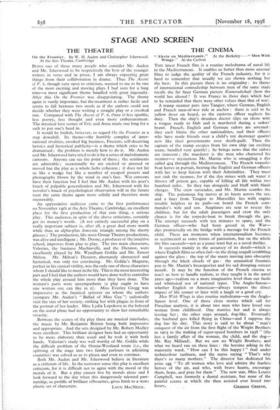THE CINEMA " Alerte en Mediterranee." At the Berkeley — " Men
With Wings." At the Carlton
This latest French film is a routine melodrama of naval life in the Mediterranean. It enables us better than more unusual films to judge the quality of the French industry, for it is hard to remember that usually we are shown nothing but the best. In this picture there is no originality : its theme of international comradeship between men of the same trade -recalls the far finer German picture Kameradschaft (how the world has altered ! It was France in those days which had to be reminded that there were other values than that of war).
A tramp steamer puts into Tangier, where German, English and French men-of-war ride at anchor : there is said to be yellow fever on board, so the customs officer neglects his duty. Then the ship's drunken doctor slips on shore with a tongue ready to blab and is murdered during a sailors' brawl. French, English and German sailors are arrested : they each blame the other nationalities, and their officers who have made friends over a child's toy destroyer quarrel now like their governments over death-guilt. Then the captain of the tramp escapes from his own ship (an exciting scene, handled very quietly) ; he brings news that the sailors are innocent ; the murderer is the man who chartered his steamer—a mysterious Mr. Martin who is smuggling a dye called 424 through the Mediterranean. The French torpedo- boat leaves in pursuit, bearing the English and German officers with her to keep liaison with their Admiralties. They must not sink the steamer, for if the dye mixes with salt water it throws off poison gai, capable of killing all life within two hundred miles. So they run alongside and bluff with blank charges. The crew surrender, and Mr. Martin scuttles the ship. The poisonous fog moves at 20 knots across the sea, and a liner from Tangier to Marseilles lies with engine trouble helpless in its path—on board the French com- mander's wife and son. Seaplanes are sent to rescue the children, but for the adult passengers and crew the only chance is for the torpedo-boat to break through the gas. The attempt succeeds with ten minutes to spare, and the German officer—who had been gassed in the War— dies protractedly on the bridge with a message for the French child. There are moments when internationalism becomes as sentimental as some forms of patriotism, but on the whole the film succeeds—not as a peace tract but as a naval thriller.
It succeeds mainly in the accuracy of its detail—which is where English films so often fail—in the dying seagull scrabbling against the glass : the top of the masts moving into obscurity through the black clouds of gas : the unnautical fountain pen in Mr. Martin's breastpocket and his sad drooping outcast mouth. It may be the function of the French cinema to teach us how to handle realism, as they taught it in the navel years ago—realism on a more imaginative level than our facile and whimsical use of national types. The Anglo-Saxon— whether English or American—always tempers the direct impact of life sooner or later with a laugh or a good cry.
Men With Wings is also routine melodrama—on the Anglo- Saxon level. One of those clean stories which call for Freudian analysis, it is about two men who have loved one woman from childhood. One marries her and is always leaving her ; the other stays around, dog-like. Eventually the husband gets killed flying in China—and I suppose the dog has' his day. This story is said to be about " man's conquest of the air from the first flight of the Wright Brothers in 1903 to the making of super-speed bombers in 1938 " (the last a family affair of the woman, the child, and the dog— Mr. Ray Milland). But we saw no Wright Brothers, and what we heard ran on these lines : the heroine asking in the maternity ward, " How can I be this happy ? " frail under technicolour sunburn, and the nurse saying " That's why there's so many mothers." The director has dedicated his prize egg " To all women who love and admire the fearless heroes of the air, and who, with brave hearts, encourage them, hope, and pray for them." The new star, Miss Louise Campbell, was formerly a dental assistant, but none of the painful scenes at which she then assisted ever lasted two
























































 Previous page
Previous page